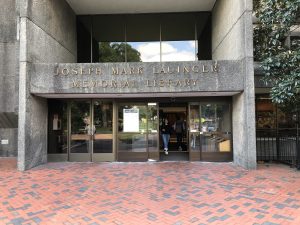Students of Georgetown Inc., better known as The Corp, a student-run nonprofit organization employing over 350 students at Georgetown, released a report of the demographic information of students who applied to work for any one of its eight subsidiary companies in the fall 2021 semester. This was the first year such data was collected, and the organization hopes the data will pave the way for a more inclusive and accessible hiring process for future students.
The report created using this data found that overall diversity in the hiring class increased compared to that of the applicant pool. For instance, students identifying with the LGBTQIA+ community demonstrated one of the more profound differences: 25.2 percent of the applicant pool and 29.2 percent of the hiring class identified as LGBTQIA+, which is greater than both the university and national average.
“We’re really thrilled that we’ve been able to create a space where folks feel comfortable being a part of the Corp,” Harper Thomas (SFS ’22), chair of the board of the directors of the Corp, said. “A lot of that credit is due to Qorp [the Corp’s queer affinity group], one of our largest and oldest affinity groups within the Corp. That played a significant role in providing a dedicated space within our community.”
When students applied to work for the Corp in the fall 2021 application cycle, the written application included a voluntary, anonymous demographic information section. For categories such as ethnicity, gender identity, and military status, the demographics of the applicant pool were compared to those of the ultimate hiring class. The application process has two steps: the written application and, for selected applicants, an interview.
“Previously, we had only sent out a voluntary demographic survey to people who received interviews,” Taotao Li (SFS ’22), vice president of people operations for the Corp, said. “We realized that that was not the most representative population and that we could do better in collecting this voluntary data to bolster our hiring outreach efforts and learn how we could make the Corp a more inclusive and welcoming space.”
The report also provides an avenue for Corp employees to ensure they have an inclusive work environment and track the progress of the Corp in achieving these goals semester by semester. “This report is just the beginning of Corp-wide growth,” Corp COO Nina Yee (COL ’23) said. “I’ve already witnessed how the report has inspired employees to take ownership of their identity within The Corp and demand improvement.”
Despite the overall success of the survey’s findings, Corp employees acknowledge that there are ways the hiring process can be improved. Of students who applied to the Corp, only a small percentage identified as Latinx or Black—3.4 percent and 2.9 percent, respectively. In the total undergraduate population, approximately 9.2 percent of students identify as Hispanic or Latino and 6.6 percent of students identify as Black or African American.
“We noticed that Latinx and Black individuals made up fairly small percentages of our applicant pool, so one focus of our hiring outreach this semester is making sure that we’re reaching underrepresented groups and bolstering partnerships with them throughout the semester,” Li said. “Something that came out of this report is that we could probably do a better job with outreach.”
Representative data from this voluntary demographic survey could only be produced if the vast majority of students opted to complete it. In total, 95.3 percent of applicants to the Corp’s storefronts and services filled out the survey in its entirety. 2.3 percent chose to opt out completely, and the remaining students answered some questions, but not others.
The Corp publicly released the results of this report to foster a sense of transparency with the Georgetown community. “The Corp is, among other things, one of the largest employers of students on campus, so people have a right to know what we’re doing to make sure we’re creating the most equitable and accessible hiring process,” Thomas said. “We hope that it cultivates a culture of openness and trust with the community at large.”






